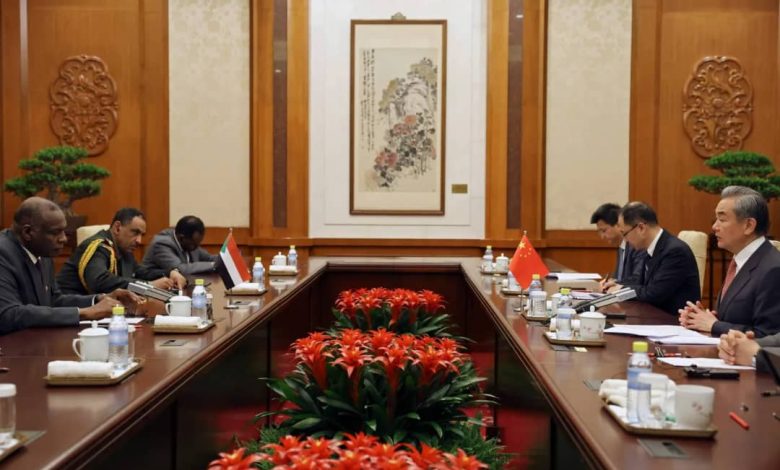Sudan Urges China to Disable “Rapid Support” Drones

Sudan Events – Agencies
On Thursday, the Sudanese government called on its Chinese counterpart to provide a clear explanation regarding the arrival of Chinese-made strategic and suicide drones in the hands of the Rapid Support Forces (RSF).
Government spokesperson and Minister of Information, Khalid Ali Al-Aysir, stated in an official communiqué that these weapons are being used to threaten Sudan’s national security by targeting and destroying vital infrastructure such as hospitals, electricity and water stations, and fuel depots.
He added: “These drones are also being used to commit crimes against humanity and serious violations of international humanitarian law by bombing hotels, unarmed civilians, healthcare facilities, and killing women and children.”
Al-Aysir called on the Chinese government to take a firm and urgent stance to disable the technologies used to operate these drones, “in order to preserve China’s international credibility and in respect of the historical ties with the Sudanese people.”
The Sudanese demands come less than 24 hours after a meeting between Sudan’s Foreign Minister Omar Siddiq and his Chinese counterpart Wang Yi, who affirmed China’s support for restoring peace and stability in Sudan, according to Sudan’s state news agency, SUNA.
Last April, Sudan’s Ministry of Foreign Affairs summoned the chargé d’affaires of the Chinese embassy in Port Sudan—the country’s temporary capital—to question how the RSF obtained Chinese FH-95 strategic drones. The Chinese envoy denied any links between his government and the RSF.
A New Turning Point
Previously, the RSF had relied on a variety of drones, primarily primitive suicide models. However, recent local media reports indicate that the RSF has acquired modern, winged, attack-capable drones equipped for reconnaissance, intelligence gathering, and precision strikes. This explains the increased accuracy of recent attacks and the failure of army air defenses to intercept them.
The war in Sudan, now over two years old, has taken a dangerous new turn in recent weeks, with the RSF intensifying drone attacks on army-controlled areas. These developments suggest the conflict is entering a more perilous phase.
Over the past week, drone strikes have targeted areas previously considered safe and distant from the conflict, which began in mid-April 2023. The army’s ability to maintain stability in its strongholds is now in question, especially with supply lines under threat and infrastructure under attack hundreds of kilometers from the nearest known RSF bases.
Khartoum in Darkness
Meanwhile, Sudanese authorities reported on Thursday that drone attacks had caused widespread power outages across the capital, Khartoum, and surrounding states. The RSF has continued its long-range drone offensive, more than two years into its war with the army. Recently expelled from nearly all of central Sudan, the RSF has shifted from ground assaults to aerial attacks on power stations, dams, and other infrastructure in army-held areas.
The Sudanese Electricity Company said in a statement that drone strikes hit Khartoum State on Wednesday night. Workers are now battling large fires and assessing and repairing the damage.
The statement noted that the Al-Marakhiyat, Military College, and Al-Mahdiya stations were targeted, leading to a total blackout across Khartoum State, further worsening the citizens’ suffering and disrupting essential services.
Omdurman, the second-largest city in the tri-capital area, was plunged into complete darkness, with electric-powered water stations out of service, according to local residents. Witnesses reported that drones targeted one power substation after another, sparking fires. These stations are located not far from the army’s Wadi Sidna airbase.
Widespread Destruction
In recent weeks, RSF drones have struck electricity infrastructure, airports, and fuel depots in the northern cities of Dongola, Merowe, Atbara, Al-Damer, and Shendi, as well as Port Sudan on the Red Sea—areas far from the frontlines of ground fighting.
According to Reuters, military sources reported ongoing ground battles in southern Omdurman, where the army was assaulting RSF pockets. The RSF had controlled most of the capital for nearly two years before losing ground to the army over the past three months.
The war has devastated large parts of Sudan, displacing over 13 million people and spreading famine and disease, while tens of thousands have died in the fighting. The conflict has also driven thousands to flee from the final remaining frontlines in West Kordofan, where the army is trying to secure key oil-producing areas and advance into RSF-held territory in Darfur. The army is attempting to break the siege on El Fasher, its last remaining stronghold in the region.



